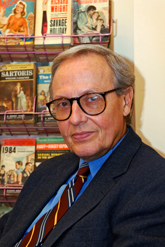In response to a recent public criticism that American literature does not merit Nobel Prizes because the US is too isolated, too insular, Werner Sollors, one of the most influential scholars of American literature and culture today, responded:
It is true that contemporary Americans tend to study fewer foreign languages than do their peers in other modernized countries. Also embarrassing is the small number of works of foreign literature translated annually into English in the United States. These are issues that deserve serious attention. American literature, however, has on the whole been remarkably open internationally and has included many, many minority, border-crossing, immigrant, refugee, multilingual, hybrid, and expatriate voices who have done the cultural work of reimagining and recasting the Unites States as a multiethnic country, connected with the whole world (Harvard UP Blog).
It is just such innovative cultural work that Sollors has accomplished in his own scholarship as Henry B. and Anne M. Cabot Professor of English, Professor of African-American Studies at Harvard University, and former Guggenheim and NEH Fellow. A prolific writer of over twenty-five authored and edited books and over one hundred articles on African American literature, ethnicity, modernism, and culture, Sollors focuses his work on the concept of ethnicity and its relation to American identity and cultural production.
Sollors's first book, Amiri Baraka / LeRoi Jones: The Quest for a Populist Modernism (Columbia university Press, 1978) was a groundbreaking analysis of a writer, which became a touchstone for studies of contemporary black writers. His following books have transformed the field of American Studies as well as other disciplines. Beyond Ethnicity: Consent and Descent in American Culture (1986) redefined the way American cultural identities are formed, namely as complex negotiations between descent (the concern for one's ethnic, racial, and familial heritage) and consent (the irrepressible desire to define where we belong, even if this goes against our familial heritage). In Neither Black Nor White Yet Both: Thematic Explorations of Interracial Literature (1997), Sollors distinguishes racial passing from the social mobility that ethnic Americans have associated with assimilation. Racial ideologies, he argues, are typically based on a denial of the spaces in between, the recovery of which became Sollors's primary aim in this book as well as in the seminal anthology, Interracialism: Black-White Intermarriage in American History, Literature, and Law he edited in 2000.
Sollors has also worked tirelessly to rehabilitate what he sees as the multilingual legacy of the United States and has argued against what he sees as the linguistic parochialism of literary study in this country. He is founder and co-director of the Longfellow Institute at Harvard University, whose task is to identify, and to bring back as the subject of study, the multitudes of culturally fascinating, historically important, or aesthetically outstanding American texts that were written in languages other than English by African Americans.
Most recently, Professor Sollors has tried to unite his twin interests in racial and linguistic hybridity by focusing on the experience of African-American intellectuals in Europe. His Anthology of Interracial Literature (2000), collects texts by authors as varied as Hans Christian Andersen and Jean Toomer that cross racial boundaries. His most current work concerns a cultural history of the American occupation of Germany and a new book on Ethnic Modernism, due out from Harvard University Press in 2008.
Professor Sollors is that rare academic, an enormously productive scholar and charismatic teacher who also feels a deep commitment to administrative work.
He earned the D.Phil. degree at the Freie Universitat Berlin in 1975 and taught at Berlin, at Columbia University, and at the Universita degli Studi di Venezia. He joined the Harvard faculty in 1983.


